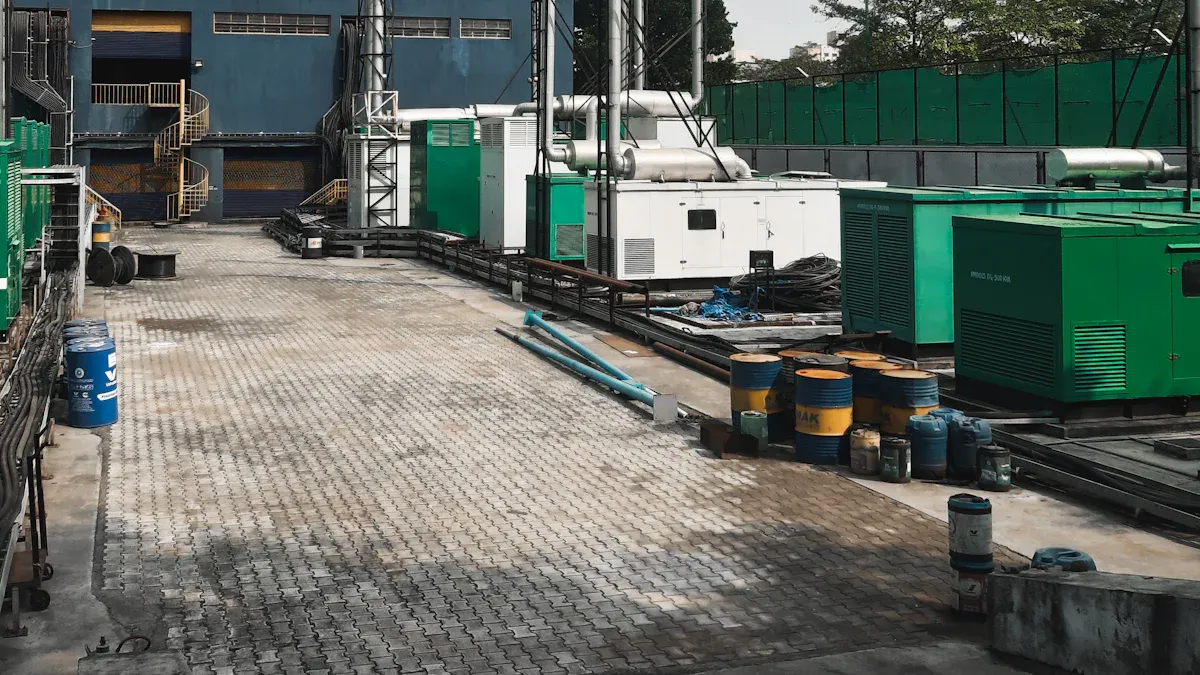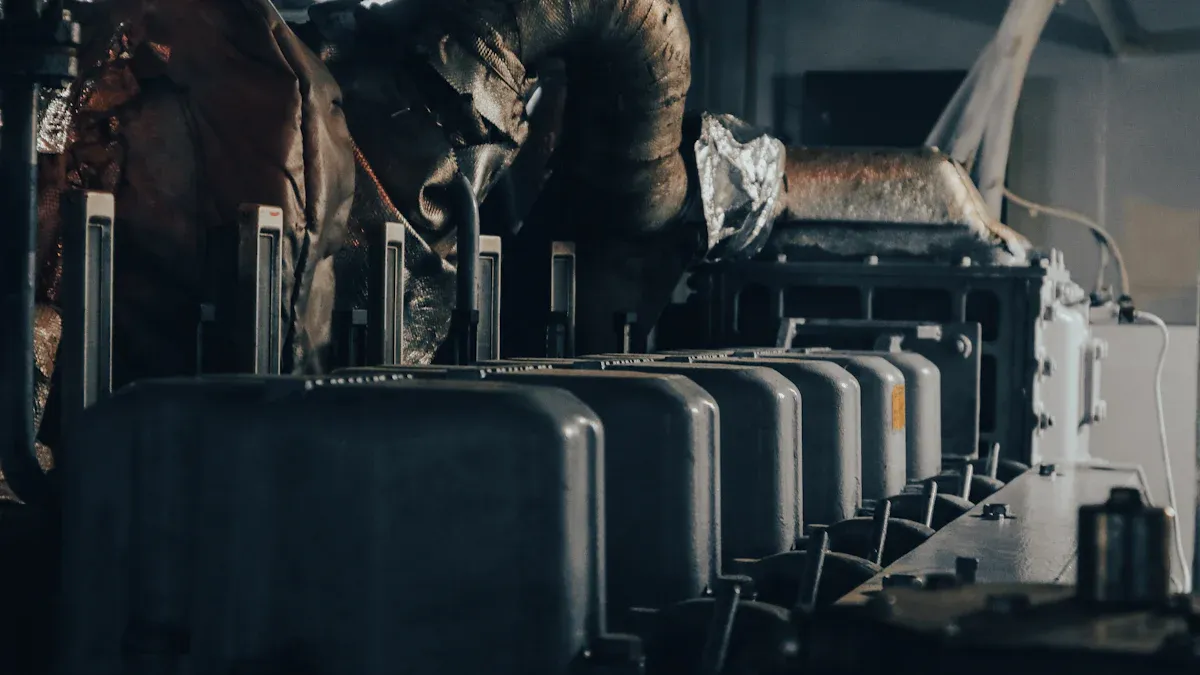
You want to save money on generators? You can find heavily discounted options from places like specialized dealers, surplus equipment sites, government auctions, and online marketplaces. Always check if the seller is reputable. Look for guarantees or warranties before you buy. Not every deal is a good one, so make sure you trust the source.
Hal-hal Penting yang Dapat Dipetik
Find heavily discounted generators from specialized dealers, surplus sites, government auctions, and online marketplaces, but always check the seller’s reputation.
Evaluate used generators by checking their age, hours used, maintenance records, brand, physical condition, and ask for load test reports to ensure reliability.
Compare prices and listings across different sellers and platforms to spot the best deals and negotiate politely for a better price.
Use secure payment methods like credit cards or PayPal to protect your money and personal information when buying a used generator.
Plan shipping or pickup carefully, inspect the generator upon arrival, and understand return and warranty policies before completing your purchase.
Heavily Discounted Generator Sources

Looking for a great deal on a generator? You have several places to check. Each source has its own benefits and things to watch out for. Let’s break down where you can find heavily discounted generators and what you should know before you buy.
Specialized Dealers
Specialized dealers focus on selling generators and related equipment. They often inspect, service, and sometimes even refurbish the units before selling them. You can find heavily discounted generators at places like:
Woodstock Power
Generators For Sale
These dealers usually offer some kind of guarantee or limited warranty. You get peace of mind because they check the equipment before selling it. If you want a generator that works right out of the box, specialized dealers are a smart choice. You can also ask questions and get advice from people who know generators inside and out.
Tip: Always ask about the warranty and return policy before you buy from a dealer.
Surplus Equipment Sites
Surplus equipment sites sell items that businesses or organizations no longer need. These sites often have heavily discounted generators because companies want to clear out old inventory fast. Surplus Record is a popular site for this kind of deal.
You might find a wide range of brands and sizes. Sometimes, you can even spot industrial-grade generators at a fraction of the original price. Surplus sites may not always offer a warranty, so check the listing details carefully. If you know what you’re looking for, you can score a great deal here.
Government Auctions
Government auctions are another place to find heavily discounted generators. Agencies like schools, city offices, or even the military sell off equipment they no longer use. You can check out sites like GovDeals and GovPlanet for these auctions.
At government auctions, you might find generators that have been well-maintained but are no longer needed. The prices can be much lower than buying new. You will need to do your homework, though. Sometimes, you have to pick up the generator yourself or arrange shipping. Make sure you read the auction terms before you bid.
Pasar Online
Online marketplaces like Facebook Marketplace and eBay are popular spots for finding heavily discounted generators. You can search for local deals or even have a generator shipped to you. These platforms let you compare lots of listings quickly.
When you shop on eBay, you can check the seller’s feedback score. Studies show that sellers with high positive feedback ratings get more sales and can even charge higher prices. This means you can trust sellers with good reputations more than new or poorly rated ones. The feedback system helps you avoid bad deals and find sellers who care about buyer satisfaction. While there isn’t direct data for generators on Facebook Marketplace, the same idea applies—look for sellers with lots of positive reviews and clear communication.
Sellers with strong reputations usually offer better deals and smoother transactions.
Negative feedback can mean trouble, so always check reviews before you buy.
The feedback system helps you spot trustworthy sellers and avoid problems.
Catatan: Always meet in a safe place if you buy locally. Ask to see the generator running before you pay.
No matter where you shop, always choose reputable sellers. Look for guarantees or limited warranties. This way, you protect yourself and make sure your heavily discounted generator is a real bargain.
Mengevaluasi Generator Bekas

When you shop for a used generator, you want to make sure you get a unit that will last and perform well. Here’s how you can check if a generator is worth your money.
Age and Hours
The age of a generator and the number of hours it has run tell you a lot about its remaining life. Most generators, especially gas turbines, have a typical lifespan between 24,000 and 35,000 hours before major failure. If you see a generator with high hours, you might face more repairs and higher costs soon.
Here’s a quick guide to help you judge the numbers:
Parameter / Benchmark | Numerical Value / Range | What It Means |
|---|---|---|
Failure time of gas turbines | 24,000 to 35,000 hours | Most units last this long before major issues |
Capacity factor degradation rate | 0.18% to 0.98% per year | Efficiency drops a little each year |
O&M cost increase after 6 years | ~8% | Maintenance gets more expensive as the unit ages |
Energy Not Supplied (ENS) increase after 6 years | ~12% | Reliability drops, so you might get less power when you need it |
Tip: Ask the seller for the total hours run and the year the generator was made. Lower hours and newer models usually mean fewer problems.
Maintenance Records
You should always check the maintenance history before you buy. Good records show the generator has been cared for and can save you from surprise breakdowns. Studies show that strong maintenance can save billions in repair and downtime costs. There are three main types of maintenance:
Reactive maintenance: Fixes only after something breaks. This is okay for cheap, easy-to-replace parts but risky for big machines.
Preventive maintenance: Regular check-ups based on a schedule. This keeps things running but can sometimes mean extra downtime.
Predictive maintenance: Uses sensors and data to spot problems before they happen. This method cuts costs and downtime, but it needs special equipment and training.
Predictive maintenance, with real-time monitoring, can cut unplanned downtime by up to 50% and lower maintenance costs by 10-40%. If you see a generator with detailed records and sensor data, you know it’s been watched closely.
Merek dan Model
Not all generators are created equal. Some brands have a long history of making reliable machines. When you look at used generators, you should focus on names like Cummins, Caterpillar, and Generac. These companies have built their reputations on durability, strong service networks, and innovation.
Cummins: Known for diesel and natural gas generators from 2.5kW to 3,500kW. They offer great service and support.
Caterpillar: Famous for tough, long-lasting generators with features like hardened crankshafts and high-strength blocks.
Generac: Popular for commercial and industrial use, with a focus on durability and broad applications.
These brands are trusted in hospitals, data centers, factories, and remote sites where power is critical. Their used generators often pass strict inspections and come with support, making them a smart choice.
Physical Condition
Take a close look at the generator’s exterior and interior. Check for rust, oil leaks, worn wires, or broken parts. A clean, well-kept generator usually means the owner took care of it. If you see lots of damage or missing panels, you might face big repair bills soon.
Look for signs of regular cleaning and maintenance.
Check the control panel for error codes or warning lights.
Inspect hoses, belts, and connections for cracks or wear.
Catatan: Don’t be afraid to ask for more photos or a video of the generator running. A good seller will be happy to show you.
Pengujian Beban
Load testing is one of the best ways to know if a used generator can handle real work. This test runs the generator at full power to see if it meets its rated output without overheating or failing. Some sellers offer “witness load testing,” where you or a third party can watch the test in person. This adds an extra layer of trust.
Load testing checks power output, stability, and fuel efficiency.
Full load tests push the generator to its limits, making sure it can handle peak demand.
Load bank testing uses artificial loads, so you don’t have to connect real equipment.
Regular load testing (at least once a year) helps spot problems like overheating or voltage drops.
Pro Tip: Always ask for a recent load test report. If possible, attend the test or have an expert review the results. This way, you know the generator is safe and ready for action.
By following these steps, you can spot a great deal and avoid costly mistakes. A little homework now can save you a lot of trouble later!
Finding the Best Deals
Seasonal Timing
You might not know this, but timing can make a big difference when you shop for used generators. Late summer to early fall is often the best time to find heavily discounted units. Many businesses upgrade their equipment before winter, so they sell off older generators. You can take advantage of this wave of inventory. If you shop during these months, you will see more choices and better prices.
Tip: Set up alerts on your favorite sites. You will get notified when new deals pop up, so you never miss out.
Comparing Listings
Don’t settle for the first generator you see. Compare listings across different platforms and sellers. You can use a simple table to keep track:
Seller/Platform | Price | Brand/Model | Hours Used | Garansi | Catatan |
|---|---|---|---|---|---|
Woodstock Power | $2,500 | Cummins | 1,200 | Yes | Refurbished |
Surplus Record | $1,800 | Generac | 2,000 | No | Needs service |
Facebook Marketplace | $1,600 | Ulat | 1,500 | No | Local pickup |
This way, you can spot the best value and avoid overpaying. Always check for hidden fees or shipping costs.
Negotiation Tips
You can often get a better deal if you ask. Start by researching the market value of the generator you want. Use your list of prices to show sellers you know what a fair price looks like. If you see several similar generators, let the seller know you have other options. Sellers may lower the price to close the deal.
Be polite and friendly.
Ask if the price is flexible.
Mention any repairs or missing parts as reasons for a lower price.
Catatan: If a seller won’t budge, you can always walk away. There are plenty of heavily discounted generators out there.
Purchase and Delivery Tips
Payment Methods
When you buy a used generator, always use secure payment methods. You want to protect your money and your personal information. Trusted options include credit cards, PayPal, and escrow services. These methods offer fraud protection and help you get your money back if something goes wrong.
Here’s why secure payments matter:
Real-time fraud detection tools spot suspicious activity fast.
Security updates and patches keep your data safe from new threats.
Payment systems follow strict rules like PCI DSS and GDPR, which protect your information.
EMV chip cards and tokenization make it hard for thieves to steal your card details.
Biometric checks, like fingerprints or face scans, add another layer of safety.
Tip: Always double-check the seller’s reputation before you pay. Look for reviews, ratings, and business credentials.
Shipping and Pickup
Generators are heavy and bulky. You need to plan how you’ll get yours home. Some sellers offer delivery, while others expect you to arrange pickup. Before you agree, ask about shipping costs, delivery times, and what happens if the generator arrives damaged.
Here’s a quick look at shipping options and what to expect:
Shipping Mode | Cost Insights | Performance Metrics |
|---|---|---|
Truckload | Best for very heavy loads; higher cost but direct | On-time rates: 85%-97% (varies by carrier) |
Intermodal | Saves about 20% for long distances (1000+ miles) | May take longer, but cost-effective |
Accessorial Charges | Extra fees (liftgate, detention) add 5-10% to bill | Watch for hidden costs |
AI-powered freight tools can help sellers and buyers find the best shipping deals. These tools track costs and delivery times, saving you money and hassle. On average, people save 5-7% on shipping when they use these smart systems.
Catatan: When your generator arrives, inspect it right away. Check for damage before you sign any paperwork.
Return Policies
Before you buy, read the return and warranty policies. Some sellers offer a short return window or a limited warranty. Others sell items “as is,” which means you take all the risk.
Ask if you can return the generator if it doesn’t work as promised.
Find out who pays for return shipping.
Get warranty details in writing.
Tip: A clear return policy protects you if the generator has hidden problems. Always keep your receipts and any emails with the seller.
You now know where to find the best deals on used generators. Always check the quality, compare different sellers, and ask for a better price. When you spot a heavily discounted generator that meets your needs, move fast—these deals do not last long. Use the tips from this guide to shop with confidence and save money.
PERTANYAAN YANG SERING DIAJUKAN
How do I know if a used generator is a good deal?
Check the brand, age, hours used, and maintenance records. Compare prices with other listings. Ask for a load test report. If the generator looks clean and runs well, you probably found a good deal.
Can I trust generators sold on Facebook Marketplace or eBay?
You can find great deals, but always check the seller’s reviews and ratings. Meet in a safe place. Ask to see the generator running before you pay. If something feels off, walk away.
What size generator do I need for my home?
Make a list of the things you want to power. Add up their wattage. Most homes need a generator with at least 5,000 to 7,500 watts. If you want to run more, choose a bigger unit.
Apakah genset bekas dilengkapi dengan garansi?
Some dealers offer a limited warranty or guarantee. Surplus sites and auctions usually sell “as is.” Always ask about the warranty before you buy. Get the details in writing so you know what’s covered.
What should I do if my generator arrives damaged?
Inspect your generator as soon as it arrives. Take photos of any damage. Contact the seller right away. Keep all paperwork and emails. Most sellers will help you fix the problem or offer a return.


